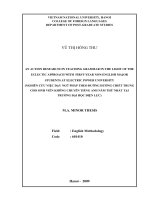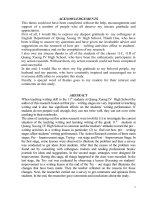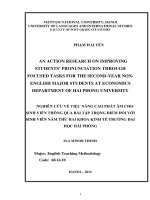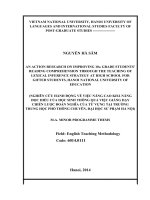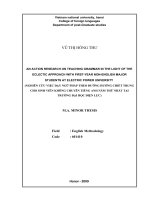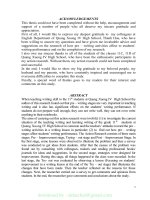An action research on the impacts of extensive reading on non-English major freshmen’s vocabulary acquisition at University of Economics - Technology for Industries
Bạn đang xem bản rút gọn của tài liệu. Xem và tải ngay bản đầy đủ của tài liệu tại đây (505.37 KB, 11 trang )
KINH TẾ - XÃ HỘI
AN ACTION RESEARCH ON THE IMPACTS OF EXTENSIVE READING
ON NON-ENGLISH MAJOR FRESHMEN’S VOCABULARY ACQUISITION
AT UNIVERSITY OF ECONOMICS - TECHNOLOGY FOR INDUSTRIES
NGHIÊN CỨU ẢNH HƯỞNG CỦA PHƯƠNG PHÁP ĐỌC MỞ RỘNG
ĐỐI VỚI VIỆC HỌC TỪ VỰNG CỦA SINH VIÊN KHÔNG CHUYÊN
NĂM THỨ NHẤT TẠI TRƯỜNG ĐẠI HỌC KINH TẾ - KỸ THUẬT CÔNG NGHIỆP
Nguyễn Thị Thanh Hà, Nguyễn Thúy Ngọc
Khoa Ngoại ngữ, Trường Đại học Kinh tế - Kỹ thuật Cơng nghiệp
Đến Tịa soạn ngày 19/10/2020, chấp nhận đăng ngày 10/11/2020
Abstract:
This research aims to investigate the effects of extensive reading on the development of
vocabulary acquisition of the freshmen at University of Economics - Technology for
Industries (UNETI). Mixed methodology was employed with data collecting instruments as
pre-test & post-test, reflective journals and questionnaires. The validity and internal
consistency reliability of the research was evaluated through the results of the T-test and the
Cronbach’s alpha coefficient. It is indicated that extensive reading had a significant role in
expanding students’ vocabulary knowledge and promoting their vocabulary learning.
Besides, the project encouraged the participants to create their own reading habit. The
study also discussed some pedagogical implications for schools, teachers and learners
that will teach and learn English in relation to extensive reading. In addition, some
suggestions for further research in the area were made as well.
Keywords:
Extensive reading, graded readers, vocabulary acquisition.
Tóm tắt:
Nghiên cứu tìm hiểu ảnh hưởng của phương pháp đọc mở rộng đối với việc học từ vựng
của sinh viên năm thứ nhất Trường Đại học Kinh tế - Kỹ thuật Công nghiệp (UNETI).
Phương pháp hỗn hợp được sử dụng với công cụ thu thập dữ liệu gồm bài kiểm tra trước và
sau khi áp dụng phương pháp, nhật ký suy tưởng và bảng câu hỏi. Tính xác thực và độ tin
cậy nhất quán của nghiên cứu được đánh giá thông qua kết quả kiểm định T-test và hệ số
Cronbach alpha. Kết quả cho thấy việc đọc mở rộng đóng vai trị quan trọng trong việc tăng
khả năng thu nhận vốn từ của sinh viên, đồng thời thúc đẩy việc học từ vựng của họ. Nghiên
cứu giúp những người tham gia tự tạo cho mình thói quen đọc sách; đồng thời, thảo luận về
các tác động sư phạm đến trường học, giáo viên và người học khi áp dụng phương pháp
này. Bên cạnh đó, một số đề xuất được trình bày cho các nghiên cứu có liên quan đến lĩnh
vực về phương pháp đọc mở rộng trong tương lai.
Từ khóa:
Đọc mở rộng, sách phân loại theo từng cấp độ ngôn ngữ, tiếp nhận từ vựng.
1. INTRODUCTION
1.1. Definition of Vocabulary
In Cambridge dictionary, vocabulary is
defined as “all the words known and used by a
TẠP CHÍ KHOA HỌC & CƠNG NGHỆ . SỐ 28 - 2021
particular person” or “all the words that exist
in a particular language or subject”.
According to Day and Bamford (2005),
vocabulary is regarded as an element linking
languages skills in English as foreign
87
KINH TẾ - XÃ HỘI
language (EFL) that learners must know to
listen, speak, read and write effectively.
Pigada and Schmitt (2006) argue that
vocabulary and lexical units are at the core of
learning and communication.
outside of the classroom and at each learner’s
own pace and level.
1.2. Vocabulary learning
A great deal of studies has reported the
positive influences on various aspects of
students’ foreign language ability. First and
foremost, students’ reading ability is enriched,
thanks to extensive reading. Learners’ reading
ability level is gradually upgraded when
moving from reading word-by-word to
reading-with ideas; hence, enhancing reading
fluency (Hitosugi & Day, 2004). Furthermore,
knowledge excluded from students’ reading
process is also claimed through Day &
Bamford (2005). The second merit of
extensive reading is found on other language
skills when Pigada and Schmitt (2006)
indicate that extensive reading facilities
grammar learning. Besides, students’ writing
capacity is directly influenced in Hitosugi &
Day (2004). Elley & Mangubhai (1981) cited
in Nguyen Thi Lam Anh (2008) report gains
in listening and writing ability in their study
investigating the impacts of an extensive
program in primary schools. Last but not least,
in
terms
of vocabulary knowledge
development, it is confirmed that the number
of new words that students obtain during short
time they spend in language classroom is not
substantial compared with lexical knowledge
that learners acquire from reading books.
1.2.1. Incidental vocabulary learning: can
be defined as a kind of learning method from
reading, listening, speaking or writing to
language use meanwhile learners concentrate
on the information of passages or texts. In
other words, Pigada and Schmitt (2006)
state that this method consists of learning
from extensive reading, listening to stories,
watching English movies or taking part
in conversation in either outside or in
classrooms.
1.2.2. Intentional vocabulary learning: is the
method that words are absorbed through
learners’ direct contact with the form and
meaning of words, such as dictionaires,
vocabulary lists and direct vocabulary
explanation. However, it is time consuming
and too laborious for learners to learn
language. In addition, this approach is teacher
- centered which does not suit to the teaching
and learning modals nowadays.
2. LITERATURE REVIEW
2.1. Extensive reading
2.1.1. Definition of extensive reading
Day and Bamford (2005) conclude that
extensive reading is a way of the careful,
short, complex reading texts for detailed
understanding and skills practice. Parrott
(1993), cited in Nguyen Thi Lam Anh (2008),
advocates that extensive reading aims for
one’s own pleasure, mainly involving the
information content. The features generally
include the comparatively fast reading of
a numerous longer, easy-to-understand
materials, with the reading done mostly
88
2.1.2. Benefits and limitations of extensive
reading
Nevertheless, it is argued that vocabulary
development in reading is time-consuming for
two reasons. The first problem is that students
have to read a large amount of materials, so
the word meaning they perceive or guess may
not be exact (Parry, 1993 cited in Nguyen Thi
Lam Anh, 2008). The second issue is if the
words they come across while reading are not
practiced, they will probably forget them.
TẠP CHÍ KHOA HỌC & CÔNG NGHỆ . SỐ 28 - 2021
KINH TẾ - XÃ HỘI
2.2. Graded readers
Richards and Schmidt (2013) define graded
readers as a simplified version of a previously
written work or an original work written in a
simple language.
It is plain that selecting appropriate level for
extensive reading is a challenge for EFL
teachers and learners. Therefore, the scale
offered by Extensive Reading Foundation
(ERF) is respectively recommended.
It is apparent that seven different levels, each
with sub-levels for further classification are
divided in the ERF graded scale. The
headword count of the books should be found
and seen where it fits the scale; then the
reading materials can be labelled at that level
for easy selection by students.
Undoubtedly, the classifications of graded
readers help EFL students find the reading
documents that fit their English proficiency
and so bring enjoyment from reading activity.
2.3. Related
reading
studies
about
extensive
2.3.1. Foreign researches
The effectiveness of extensive reading was
investigated by Hitosugi & Day (2004) at the
University of Hawai’i using Japanese
children’s literature in a period of 10 weeks.
As Japanese was their target language, the
researchers selected reading materials written
for children in their first language. The
findings were reported that the students’
reading ability gained a little but there was an
increase in positive responses on the
questionnaire about participants’ feeling and
emotions from the beginning to the end of the
semester and extensive reading program led to
independent study in Japanese.
Pigada and Schmitt (2006) indicated in the
study on a 27-year-old learner who speaks
TẠP CHÍ KHOA HỌC & CƠNG NGHỆ . SỐ 28 - 2021
English fluently that extensive reading
enhanced knowledge of words’ spelling,
meaning and grammatical characteristics.
Throughout the study, the participants had to
take pre- and post-test first, then were
nterviewed for the practitioners to crosscheck
the validity and reliability of the information.
The results indicated that 1 per 1.5 target
words tested was fostered in several ways
It is apparent that extensive reading has been
complied in different teaching contexts. Those
studies also originated a basis for domestic
researchers to explore the influences of
utilizing graded readers in their own classes.
The next part will discuss some Vietnamese
authors’ studies on extensive reading.
2.3.2. Vietnamese researches
A study conducted by Nguyen Thi Lam Anh
(2008) on the population of 30 second-year
students at Military Political Academy during
6 weeks revealed that learners gained some
progress in vocabulary learning and learners’
positive attitude towards extensive reading
was significantly improved. The validity and
reliability of the data collected from
questionnaires, reading journals and pre- and
post-test was crosschecked respectively.
Serving the same aims of examining the
impacts of extensive reading program,
Nguyen Thi Thu Huong (2013) carried out an
action research with 41 non-English major
students at Thai Nguyen University of
Education in eight weeks outside class. After
analyzing the database from reflective
journals, follow-up activities and interview,
the author found that the students learned new
words while reading extensively. In addition,
the participants showed positive attitude to
graded readers because they reported that the
reading materials were interesting and useful.
For all these benefits of extensive reading
89
KINH TẾ - XÃ HỘI
investigated in both international and national
institutions, the researcher decided to examine
its influences on students’ vocabulary
acquisition at UNETI.
as the words that are most frequently used by
native speakers. Therefore, a series of graded
readers of Oxford Read and Imagine was
taken as the main reading resources for the
participants.
3. RESEARCH METHODOLOGY
3.4. Data collection instruments
3.1. Research questions
This study aims to explore the impacts of
extensive reading on non-English majored
freshmen’s vocabulary learning at UNETI and
their perspectives towards this approach.
Therefore, the researcher conducted an action
research to address two questions
▪ To what extent does the extensive
reading influence the students’ vocabulary
acquisition?
▪ What are the students’
towards extensive reading?
perspectives
3.2. The population
The study was conducted based on the
participation of 31 freshmen from different
faculties at UNETI. They were chosen
randomly according to their names on the
researchers’ class lists to guarantee the
reliability of the project. They are non-English
majored. All of them passed the entrance
exams including English test, so they are
considered to be at elementary level of
English proficiency.
3.3. Reading materials
The selection of books for extensive reading
project was based on the participants’ English
levels which is considered to be at elementary
level of proficiency. Hence, the researcher
selected graded readers in level 1 with
300-400 headwords and level 2 with 600-700
ones. Another important thing is that the
typical features of graded readers cannot be
complicated sentence structure and the use of
headwords which are chosen by the publisher
90
3.4.1. Tests
Pre-test and post-test were implemented to
investigate the influences of extensive reading
on learners’ vocabulary learning. The same
test was used without informing the students
to assure that they would not use any
memorization techniques to remember the
words in the former test. The quantitative data
collected from those tests was to measure the
differences might have been caused by the
treatment. In addition, the students were
informed that the results of the test would not
affect their grade to guarantee the reliability
of the test.
3.4.2. Reflective journal
Students were asked to complete the reflective
journal with the aims of helping the researcher
monitor students’ reading. Hence, she could
offer guidance and decided what was
necessary to be modified in the next circle of
the action. The report was adapted from Day
and Bamford (2002) because it helped the
teacher to access learners’ achievement over
period and enabled leaners not only to record
their ideas and responses and their own
progress as well.
3.4.3. Questionnaire
A questionnaire was delivered to the
participants at the end of the project to
investigate the learners’ attitudes towards
extensive reading program. Some items were
adapted from the one of Nguyen Thi Lam Anh
(2008) because this study got the similar
purposes as those in this research.
TẠP CHÍ KHOA HỌC & CÔNG NGHỆ . SỐ 28 - 2021
KINH TẾ - XÃ HỘI
4. FINDINGS AND DISCUSSIONS
4.1. To what extent does the extensive
reading influence the students’ vocabulary
acquisition?
4.1.1. Pre-test results
The Statistical Package for the Social
Sciences (SPSS) version 22.0 was utilized to
analyze the results of the test. The table 5.1
presents the results of this test which really
varied. Three quarters of the participants had
scores below average. Although they passed
the entrance exam, their results were quite
poor. A reason might be that they did not
spend much time reading in English language.
As mentioned before, concerning vocabulary
acquisition, the majority of the students
leaned new words through reading low-level
texts in the course books before the project.
Moreover, the students hardly got the habit of
reading extra English texts. Another
explanation may be that they could not find
the suitable reading sources.
and the highest was 119. From the analysis,
7/31 students got score from 63 to 70; the
score from 74 to 90 were graded for 15/33
students; 4 out of 33 students got from 93 to
99; and 4 students got score over 100. The
findings revealed that most of the students got
score above average.
Table 2. Results of the post-test
N
Score on
Test after
treatment
31
Valid N
31
Min.
Max.
Mean
Std.
Deviation
63
119
81.34
16.340
4.1.3. Comparison between pre-test and
post-test
The table below reports the descriptive
statistics of the pre-test and post-test.
Table 3. Descriptive statistics of pre-test
and post-test
N
Mean
Std.
Deviation
Std.
Error
Mean
Table 1. Results of the pre-test
N
Score on
Test before
treatment
31
Valid N
31
Valid N
31
Min. Max. Mean
45
92
63.73
Std.
Deviation
12.884
4.1.2. Post-test results
The post-test was given at the end of the
project to determine the impacts of extensive
reading on learners’ vocabulary. The table 2
below shows the results of the test.
It can be seen from the table 2, the mean score
was 81.34, the lowest score of the test was 63
TẠP CHÍ KHOA HỌC & CƠNG NGHỆ . SỐ 28 - 2021
Score on Test
before treatment
31 63.73
12.884
2.635
Score on Test
after treatment
31 81.34
16.340
3.303
The table shows that the mean of the post-test
(81.34) was higher than that of the pre-test
(63.73). Thus, it is indicated that there was an
increase of 17.61 points between two tests.
The standard deviation in the pre-test (12.884)
was much smaller than that in the post-test
(16.340). As a matter of fact, the students
gained over 17 points on their vocabulary
post-test. As a result, it was suggested that
there was an improvement in vocabulary
knowledge of the students.
91
KINH TẾ - XÃ HỘI
Table 4. The comparison between pre- and post-test results on mean score
Paired differences
Mean
Std.
Deviation
Std.
Error
Mean
t
df
Sig.
(2-tailed)
−17.522
23
.001
95% Confidence
interval
of the difference
Lower
Upper
−18.643
−16.828
Score on Test Before
Treatment
Score on Test After
Treatment
−17.612
3,456
The table showed that the critical value of df
for a two-tailed test with degree of freedom
was 23. By conventional criteria, the
difference in means of two tests is considered,
t=−17.522, p = 0.001 (<0.05). It demonstrated
that the difference reached a statistically
significant level. It pointed out that a positive
improvement in school’s vocabulary learning
after they read extensively. It also meant that
the extensive reading program seemed to be
effective in the sense that it helped to develop
the students’ vocabulary.
4.2. What are the students’ perspectives
towards extensive reading?
4.2.1. The reflective journal
Figure 1. Students’ general feeling about the books
From the line graph it can be indicated that
the percentage of students who had positive
attitude towards the graded readers increased
lesson by lesson. In the first three lessons, few
students were really keen on the story. An
explanation analyzed from the reflective
journal, the researcher knew that it resulted
from their inexperience of reading extensively
before. They were just read the textbook
materials when they were asked to. Besides,
92
the students did not get used to guessing the
meaning of new words from the context so
they spent much time looking up in the
dictionary. Nevertheless, after having received
the first reflective journal, the researcher
clearly guided them how to guess the
unknown words, so it did not take them much
to look up new words; they needed to focus
on the content of the stories. There was a
significant increase in the following lessons
TẠP CHÍ KHOA HỌC & CƠNG NGHỆ . SỐ 28 - 2021
KINH TẾ - XÃ HỘI
when students found the graded readers better
and greater. Especially, there were no students
who reported no interests in reading books in
lesson 6, 8, 9 and 10. It is noticeable that in
lesson 7, there was about 6,46% of the
students who thought the books boring but it
accounted for 74,17% who felt good and great.
In this lesson, it could be explained that the
two students started to pick up stories in level
2 with 600-700 headwords. As a consequence,
they had negative attitude because of feeling
unfamiliar. From lesson 8 to the end of the
program, no one thought the books were
boring. In short, most of students had a
positive perspective towards the graded
readers. After 10 lessons in implementation,
the number of students enjoying reading
extensively grew dramatically while this
period experienced a considerable decline in
the percentages of students of negative
attitude.
4.2.2. Questionnaire
Through the analysis of questionnaire,
students’ attitude towards beliefs, feelings and
intentions were measured through the
Cronbach’s alpha, which reported the internal
consistency reliability of the research.
Concerning students’ belief about the project,
about 77,5% of students thought that
extensive reading program was interesting and
beneficial when they could expand their
vocabulary. There were no negative responses
and only one student said extensive reading
could not develop his/ her reading habit or the
reflective journal failed to motivate him/ her
to improve the vocabulary retention. 12,8% of
the students said extensive reading placed no
effects on their background knowledge. It is
indicated that most of the participants (90,4%)
are aware of the positive influences of
extensive reading. They commented that
reading extensively enabled them to broad
TẠP CHÍ KHOA HỌC & CÔNG NGHỆ . SỐ 28 - 2021
their knowledge and reflective journal was
useful in enhancing their vocabulary intention.
Their answer was relevant to the findings
which showed that their post-test results were
significantly higher than the pre-test. Before
the implementation, the participants stated
that they had never read any English
documents at home. In other words, the
program might orient or motivate them to read
in English and build up their reading habits
for them.
In terms of students’ feelings and emotions,
90,3% of the participants indicated that they
liked post-extensive-reading activities like
writing reflective journal and a vast majority
of the students disagreed or strongly disagreed
that they felt tired from participating in this
project and up to 87,10% of the respondents
mentioned that through extensive reading
activity, they felt pleased in their language
learning. It seemed that the students were
keen on the reading materials which were
introduced to and became familiar to them
when 87,08% of them felt the materials
interesting. It could be explained that graded
readers is chosen based on their interests.
Regarding the third aspect of students’
intentions, there were 29 out of 31 students
who showed their wish to read extensively
before if they had been encouraged by ticking
agree or strongly agree. 87,08% of learners
pointed out that they changed their minds on
reading in English. As mentioned before, the
students had never read at home. After the
treatment, most of them intended to read more
outside classroom. As a result, the proportion
of 90,3% showed that they would like to join
reading in the same way the following year.
The overall comparison of the students’
responses to attitudinal statements after the
projects is made by calculating the mean
scores for individual and the groups of
statements as presented in Table 5 below.
93
KINH TẾ - XÃ HỘI
Table 5. General reading attitudes after the project
Related
categories
Statements
Mean
SD
Cognitive
component of
reading attitudes:
Belief
1. My background knowledge has been improved thanks to ER
3,85
0,878
2. The ER materials were suitable for me
4.01
0.679
3. The ER project helped me develop reading habits
3.85
0.688
4. Writing weekly report was useful in improving my
vocabulary retention
3.65
0.835
5. The ER activity helped me to expand my vocabulary
4.46
0.647
6. The ER activity did not give me more pleasure in learning
English
4.20
0.518
7. I feel tired from participating in this ER project
4.07
0.506
8. The ER materials were interesting
4.03
0.865
9. I do not like post-extensive reading activities
4,03
0.548
10. I wish I had been encouraged to read extensively before
3.77
0.860
11. I start to feel like reading stories and texts in English in my
free time
4.02
0.657
12. I would like to continue reading in the same way next year
4.02
0.760
Affective
component of
reading attitudes:
Feelings,
emotions
Conative
component of
reading attitudes:
Intention
When mean scores are reviewed for individual
items in the above table, it can be seen that
item 5 received the highest rating with mean
score of 4.46. Besides, SD is relatively small
with the value of 0.647. This figure shows that
most of the students had very positive scale. It
means that they significantly believe that their
vocabulary was expanded by extensive
reading activity. Similar to item 5, item 6 also
received very high rating with mean score
4.20 and the value of SD is 0.518. It can be
interpreted that the students really enjoyed
reading graded readers and through extensive
reading activity, they were pleased in learning
English. It is apparent that all items received
high ratings with mean score from 3.65 to
4.46 and their values of SD are quite small,
range from 0.506 to 0.878. In addition, mean
scores of three attitudinal aspects, namely
beliefs, feelings and intention are 3.97; 4.07
and 3.95 respectively. The results indicate that
the students had positive attitudes towards
extensive reading program.
94
Overall
mean
3.97
4.07
3.95
From the open-ended question, students’
suggestions for enhancing future extensive
reading project were collected and
summarized. Eight students hoped that the
future project related to extensive reading
should have increased more reading materials
and they could read more than one graded
reader after a class. They also suggested that
the researcher should have added more
popular books by famous writers in the world
published in Vietnamese so that it would have
been easier for them to quickly get the target
language. Moreover, five students reported
that some types of collaborative activities
should have been organized in class so that
they could have used words in the stories. It
was believed that they could have got more
fun to work with other classmates and they
could have shared unforgettable moments
together. Last but not least, besides
soft-copies of graded readers, some students
suggested establishing a Facebook page or a
Facebook group so that they could have
TẠP CHÍ KHOA HỌC & CÔNG NGHỆ . SỐ 28 - 2021
KINH TẾ - XÃ HỘI
exchanged their stories, reading strategies,
shared the ways to overcome difficulties in
reading extensively and discussed some
difficult phrases or sentences to understand.
In a nutshell, the findings showed the positive
influences of extensive reading. In the first
place, the students’ vocabulary size and
receptive vocabulary knowledge was gained.
Secondly, extensive reading helped them
develop positive attitudes towards reading in
EFL. It is reasonable that the more students
read, the easier reading becomes. Furthermore,
leaners also stated that reading extensively
motivated them to read more. To have a good
reading habit is very crucial for students who
are expected to mainly self-study at university.
In addition, the students’ responses to the
questionnaires revealed that they strongly
appreciated the extensive reading project.
Most of them considered reading during the
project enjoyable and useful, and almost
participants would like to continue reading
extensively in the next year.
5. RECOMMENDATIONS AND CONCLUSION
5.1. Recommendations
Educational institution should create favorable
conditions for teachers and students to use the
extensive reading as it is well supported to be
a suitable method to help learners achieve
progress in vocabulary acquisition. Due to its
practical benefits, extensive reading approach
should have a due place in the curriculum or a
feasible extensive reading project should be
integrated at the school level. This program
could create a friendly environment where
learners experience reading as they might do
in their daily lives. University library should
be provided with culturally-responsive and
age-suitable graded readers to be more
attractive and motivated for students.
TẠP CHÍ KHOA HỌC & CÔNG NGHỆ . SỐ 28 - 2021
Teachers should play a role as model in
reading books so that they can encourage
students to read more. In this research, the
teacher read materials as students to
understand and guide them effectively. The
more books teachers read themselves, the
more they tend to set a good example to their
students. Hence, the model of teachers plays
an influential role in stimulating students’
motivation.
It is undeniable that students played a vital
role on the effectiveness of the project. They
are expected to be responsible for their own
reading. However, some students might not
fully understand the advantages they can get
from joining the research. As a consequence,
sometimes a small amount of students forgot
to read the extra reading materials. It is
suggested that a series of graded readers
should have been delivered to the participants
for them to pick the materials freely which
they were interested in. Additionally, when
learners are engaged in the extensive reading
activities, they should ignore unknown or
difficult words and guess the meaning of the
words based on the context because it will
take much time to look up the words, which
distracts them from getting the main idea and
makes them depend too much on dictionary.
5.2. Limitations
further studies
and
suggestions
for
Firstly, the project was conducted with a small
population, 31 freshmen. The sample size is
not big enough to generalize the findings.
Furthermore, the target participants were
first-year, not the higher level like second-year,
third-year or last-year students. Though their
scores that were used for analysis proved to be
normally distributed, this narrow range of
students prevented the researcher, to some
extent, from getting full idea of the effects of
95
KINH TẾ - XÃ HỘI
reading graded readers at varying levels of
proficiency. Hence, it can not ensure yet
whether the same extensive reading project
could solve the same problem with different
participants or not. As a result, further
researches on the same issue should be
conducted with a larger number of
participants so that the results will be more
reliable and further applicable.
should be involved in the test so that their
knowledge of the words could be reflected
more comprehensively.
5.3. Conclusion
The teacher-researcher realized students’
vocabulary at UNETI was poor and needed to
be taken into consideration. A study on the
impacts of extensive reading was carried out
on the population of 31 first-year students
from different departments at UNETI. A
mixed methodology was implemented with
the devices of pre-test, post-test; the reflective
journal and the questionnaire. The quantitative
data was compared to evaluate the effects of
the project on students’ English vocabulary.
The reflective journal and the attitudinal
questionnaire were utilized to analyze on
students’ perception towards the extensive
reading program.
Another restriction of the research is that the
study emphasizes only on one language area vocabulary and students’ perceptions on
extensive reading. It is suggested that
extensive reading is a good way to tackle the
problems of vocabulary shortfall and
disadvantageous attitudes on reading. Further
studies may look at other benefits of this kind
of material, like investigating other language
skills or elements, for example speaking,
writing, reading comprehension, spelling,
grammar or even other elements of
vocabulary acquisition such as pronunciation,
collocations, derivations and so on. Other
researchers can also examine the similarities
and differences between the effectiveness of
graded readers and other materials.
Lastly, the results are based on a small
number of self-rated words (150 items). A
larger word checklist will be more reliable
and provide more chances to investigate
growth after more unfamiliar words have been
encountered in the reading materials. In
addition, only two tests could not relfect the
whole picture of the vocabulary learning of
the participants. Only word checklist was used
to test learners’ vocabulary of the words in
this research. Hence, another studies should
be carried out to measure vocabulary gains
through extensive reading using more
sensitive instruments to degrees of acquisition.
Another idea is that all four language skills
96
For the first research question, the participants
‘vocabulary learning was impacted positively
as their score was higher in the post-test. It
can be stated that the students acquired
incidentally vocabulary through reading
extensively, which contributed to the upgrade
scoring of students’ vocabulary test. It can be
concluded that graded readers helped expand
the students’ vocabulary knowledge and
improve their vocabulary learning.
For the second research question, reading
graded readers had a positive effect on the
students’ attitudes towards reading. It is
considered as an effective way to broaden
students’ vocabulary knowledge and motivate
them in reading . The project also made other
benenfits through post-extensive reading
activities assigned by the teacher. As the
students had to write a reflection they read
every class, their writing skills and grammar
were also improved as well. Students shifted
TẠP CHÍ KHOA HỌC & CÔNG NGHỆ . SỐ 28 - 2021
KINH TẾ - XÃ HỘI
from extensive depending on dictionary to
trying to guess the meaning of strange words
based on the context. Hence, they improved
their reading skills.
REFERENCE
[1]
Richard Day & Julian Bamford (2002). Top ten principles for teaching extensive reading. Reading in a foreign
language, 14(2), 136-141.
[2]
Claire Ikumi Hitosugi & Richard Day (2004). Extensive reading in Japanese. Reading in a foreign language,
16(1), 20-30.
[3]
Nguyen Thi Lam Anh (2008). The effects of guided extensive reading on EFL learners’ vocabulary learning: An
action research at Military Political Academy. Hanoi University. Hanoi, Vietnam.
[4]
Nguyen Thi Thu Huong (2013). Extensive reading and vocabulary learning: An action research project with
non-English major students at Thai Nguyen University of Education. Hanoi University. Hanoi, Vietnam.
[5]
Maria Pigada & Norbert Schmitt (2006). Vocabulary acquisition from extensive reading: A case study. Reading
in a foreign language, 18(1), 1-28.
Thông tin liên hệ:
Nguyễn Thị Thanh Hà
Điện thoại: 092 162 8666 - Email:
Khoa Ngoại ngữ, Trường Đại học Kinh tế - Kỹ thuật Công nghiệp.
Nguyễn Thúy Ngọc
Điện thoại: 091 523 5005 - Email:
Khoa Ngoại ngữ, Trường Đại học Kinh tế - Kỹ thuật Cơng nghiệp.
TẠP CHÍ KHOA HỌC & CƠNG NGHỆ . SỐ 28 - 2021
97


